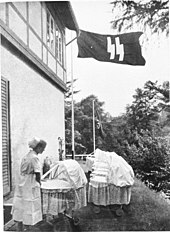Lebensborn
stands for eingetragener Verein or registered association), meaning "fount of life", was founded on 12 December 1935,[1] to counteract falling birth rates in Germany, and to promote Nazi eugenics.
[citation needed] Initially the programme served as a welfare institution for wives of SS officers; the organization ran facilities – primarily maternity homes – where women could give birth or get help with family matters.
The programme also accepted unmarried women who were either pregnant or had already given birth and were in need of aid, provided that both the woman and the father of the child were classified as "racially valuable".
[2] Leaders of the League of German Girls were instructed to recruit young women with the potential to become good breeding partners for SS officers.
[citation needed] In 1939, the Nazis started to kidnap children from foreign countries – mainly from Yugoslavia and Poland, but also Russia, Ukraine, Czechoslovakia, Romania, Estonia, Latvia, and Norway[9] – for the Lebensborn program.
[12] After the war, the branch of the Lebensborn organisation operating in north-eastern Europe was accused of kidnapping children deemed "racially valuable" in order to resettle them with German families.
[citation needed] The court found ample evidence of an existing programme of the kidnapping or forced movement of children in north-eastern Europe, but concluded that these activities were carried out by individuals who were not members of Lebensborn.
Exactly how many children were moved by Lebensborn or other organisations remains unknown due to the destruction of archives by SS members prior to fleeing the advancing Allied forces.
[citation needed] From the trial's transcript:[13] The prosecution has failed to prove with the requisite certainty the participation of Lebensborn, and the defendants connected there with in the kidnapping programme conducted by the Nazis.
Upon the evidence submitted, the defendant Sollmann is found not guilty on counts one and two of the indictment.After Germany's surrender, the press reported on the unusually good weight and health of the "super babies".
[citation needed] Himmler's effort to secure a "racially pure" Greater Germany, sloppy journalism on the subject, as well as Nazi ideology retained by some, led to persistent false assumptions about the programme.
[citation needed] The programme did intend to promote the growth of Aryan populations, through encouraging relationships between German soldiers and Nordic women in occupied countries.
[16] In Norway, children born to Norwegian mothers by German fathers were allegedly often bullied, raped, abused, and persecuted by the government after the war, and placed in mental institutions.
In 2008, their case before the European Court of Human Rights was dismissed as the events had happened too long ago, but they were each offered an £8,000 payment from the Norwegian government.
[17] ABBA member Anni-Frid Lyngstad had a German soldier father and although not a part of the Lebensborn program, she and her family faced the same retributions in post war Norway.
[18][19][20] In November 2006, in the German town of Wernigerode, an open meeting took place among several Lebensborn children, with the intention of dispelling myths and encouraging those affected to investigate their origins.
[24] Several of the surviving Lebensborn children appeared in Wars Don't End, a 2018 documentary film directed by Dheeraj Akolkar and narrated by Liv Ullmann.
[25] The Czech TV film Spring of Life (2000) tells the story of a Sudeten German teenager recruited as a future mother into a Lebensborn in Poland.




